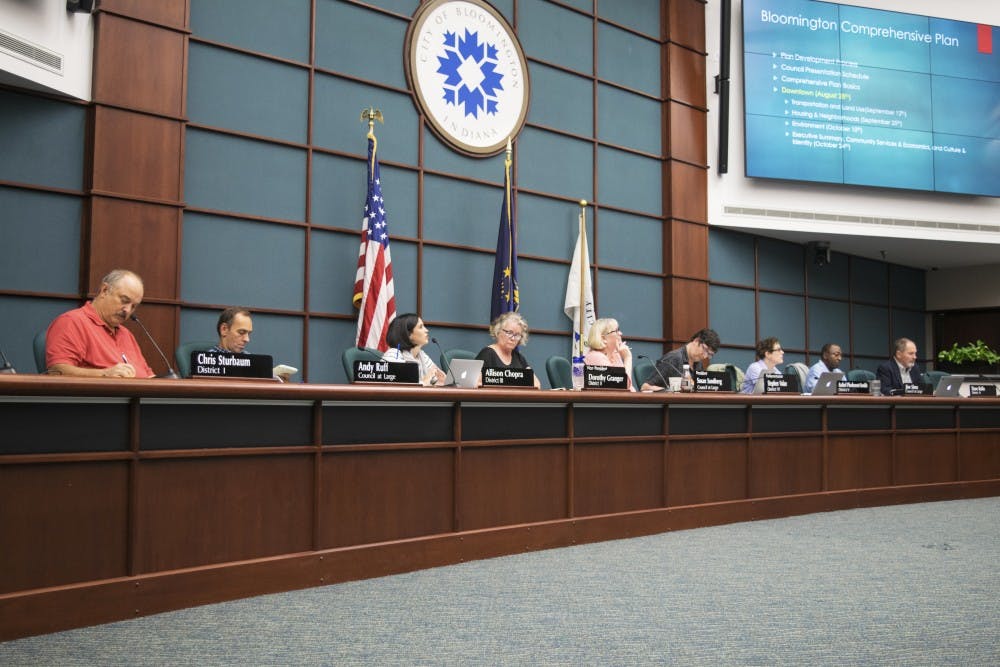Small businesses rallied around a project to expedite the renovation of a historic site in Bloomington, the Dimension Mill, at Tuesday night's Bloomington City Council meeting.
Alex Crowley, director of the Economic & Sustainable Development council, appealed to the council to lower the environmental standards as they begin an effort to renovate Dimension Mill, located at 335 W. 11th St. This building is currently being transformed into a tech park, business incubator and co-work space to attract more startups to Bloomington.
The Leadership in Energy & Environmental Design (LEED) Silver Checklist is the standard that the building would typically need to meet to qualify for renovation. This checklist is a point-based system that accounts for the environmental impacts of a building. Carbon offset, green vehicles and LED lighting are all points on the LEED scale that the Dimension Mill project team expects to gain. In short, the project remains committed to reducing carbon emissions.
To obtain silver standing, a project needs to acquire 50-59 points on a scale of 110 potential points. This rule is a piece of the Green Building Program, legislation brought to Bloomington in an effort to decrease carbon emissions and other harmful environmental factors.
The Bloomington Municipal code says if compliance with this standard would defeat the purpose of the program or place undue burden on the city department, the Common Council can waive these regulations.
The Economic & Sustainable Development (ESD) council presented to the city council that their goal in this endeavor is to maximize innovation efforts without constraint. The main argument in appealing for this waiver is that 16 of the points available on the scale will not be possible for the Dimension Mill to earn based strictly on its location. For example, points are available for projects occurring within neighborhood development zones, which the Dimension Mill is not.
To be granted this waiver, the ESD needed to prove that it will continue to try and maximize the amount of LEED points possible without being bound by legislation.
“I understand LEED isn’t perfect," councilman Chris Sturbaum said. "It has really good ideas and it has really nitpick things you have to do. It really doesn’t value the recycling of an entire building as much as I think is justified. Driving 50 miles to LEED platinum workspace defeats the purpose.”
Ellie Symes, CEO of the Bee Corp, spoke on how any delay in the Dimension Mill project could affect her own company. Symes is a graduate of IU and started the Bee Corp while she was a student there. Her team is currently working on a one-year lease because they can’t afford a longer one, and the Dimension Mill spaces are the only spaces they will be able to rent after this year.
The co-founders of the Bloomington-based office space Cowork also spoke on why it’s important that these requirements be waived in this circumstance.
“We’re seeing people choose Bloomington over Austin, Portland and Boulder because of its attention to aesthetic,” co-founder Forrest Fowler said. The Cowork team emphasized the necessity of Bloomington to gain more co-working space in order to attract and retain more small businesses.
“What I would like is some level of insurance that — specifically regarding energy use — the ESD will seriously look at things like optimizing energy efficiency,” council member Dave Rollo said.
Disapproving this resolution would set this project’s timeline back substantially. Fortunately for ESD, Rollo and council member Isabel Piedmont-Smith, both of whom were involved in drafting the Green Building Ordinance legislation in question, are in favor of supporting this waiver.
“This is the exact type of project for which we built in the waiver,” Piedmont-Smith said.
The council unanimously approved the waiver.





